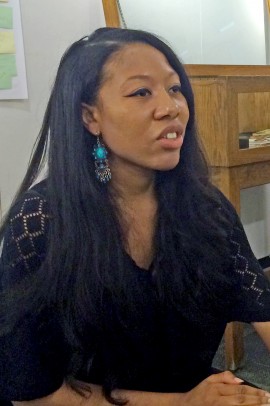Sharing stories at People’s State of the Union

Jacqueline Yvonne Smith, graduate assistant at the African-American Cultural Center, shares her opinions at the event. — Photo: Megan Carney
Students, employees and alumni from diverse backgrounds and walks of life convened on campus to share their stories, experiences and thoughts on the state of our country.
UIC hosted three sessions Jan. 27 to 29 of the many People’s State of the Union story circles nationwide. UIC’s event was sponsored by the Gender and Sexuality Center.
Participants had two minutes to tell a story about a moment when they felt true belonging or the opposite, an experience that showed them something new about the state of the union, or a time they stood together with people in the community.
Once the ball got rolling, it was hard to stop. The stories included a lesbian coming out to her family, talks of the riots in Ferguson, Missouri, discussion of resources for mental health, and more.
Two major themes became prevalent: that people physically coming together — standing shoulder to shoulder, through protests or rallies — is very powerful and that mistreatment of fellow humans is evident in everyday life, including racism, sexism and forcing labels on people.
Some of the most interesting comments came when the facilitators asked, “How will we know when we’ve arrived at the union we want to live in?”
The group had a variety of answers, including that there would be no gender or race specifications or that it wouldn’t be considered a news story when a homosexual member of society comes out. The topic of doing away with labels such as “handicapped” and “race” also was a common answer.
At the end of the event, the group was asked if they enjoyed the experience and would participate again. The answer was a resounding “yes.”
“Our goal was to offer spaces for different conversations,” said Symone Simmons, assistant director of the Gender and Sexuality Center.
Although everyone left happy, there was a still a sense of, “Now what do we do?”
“We need to stay in touch, share our experiences with different people and deepen our conversations,” said Megan Carney, director of the Gender and Sexuality Center. “We need to think about the change we want to see and strive for something we can all be happy with, within the system. Most of all though, we need each other.”
